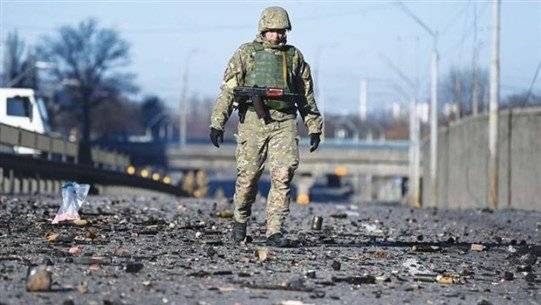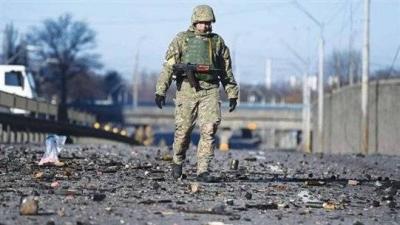The assessment provided by U.S. intelligence to the Senate Armed Services Committee the day before yesterday regarding the war in Ukraine clarifies that the world is facing a scenario that is likely to evolve into a prolonged war transforming into a war of attrition that could last for months or even years. This comes with significant security and economic crises related to food and energy, along with the risks of slipping into a new global conflict that could inevitably be nuclear given the repeated Russian threats.
Intelligence leaders who testified agreed that without either Russia or Ukraine achieving a decisive breakthrough and given the lack of indicators for any successful negotiations between the two sides at this time—considering Russian President Vladimir Putin's conviction that he can ultimately win, alongside the fact that Ukraine has shown no signs of surrender—the war will undoubtedly prolong, meaning an increase in its costs and risks.
U.S. Defense Intelligence Agency Director Lieutenant General Scott Berrier stated clearly that as the conflict heads toward a war of attrition, it is likely that the conflict could “take an unpredictable path,” a sentiment echoed by Avril Haines, the Director of National Intelligence, when she noted that Putin could resort to nuclear weapons if he feels he is losing the war. This assessment reflects the extremely complex calculations of this war, which increase in risks the longer it persists. The West, which is pumping vast amounts of advanced weaponry into Ukraine to help it counter the Russian invasion, simultaneously fears that if Putin feels he is facing the prospect of defeat, he may resort to wide-ranging escalation options, including mobilizing reserves and declaring a state of war, rather than labeling it as the current “special operation,” culminating in the use of tactical or strategic nuclear weapons against what he perceives as a proxy Western war and an “existential threat” to his regime and country.
The difficult question before strategists is, what is the point at which the West can support Ukraine without pushing Putin to feel that he is in danger of defeat? It is clear that there are parties within NATO who wish to drain Russia and weaken it through the war that Putin has become embroiled in—a goal articulated by U.S. Defense Secretary Lloyd Austin following his visit to Kyiv last month, stating that the U.S. aims to weaken Russia to prevent it from repeating what it has done in Ukraine. However, this goal is not without risks, for it is hard to imagine that Putin would accept the defeat of his forces or threats to his regime without a response that could push the world toward a significantly dangerous confrontation.
Concerns over this danger prompted French President Emmanuel Macron to warn in a speech before the European Parliament earlier this week against “humiliating Russia.” He believes that while it's crucial to support Ukraine for its survival, the West must not forget that a point will come when Moscow and Kyiv seek peace at the negotiation table. He reminded that when peace returns to European soil, “new security balances will need to be established, and we must never succumb to the temptation, desire for revenge, or humiliation; for we know how that has twisted the path to peace in the past.” Macron was referring to the Treaty of Versailles concluded after World War I, which many considered a “humiliation” for Germany and a precursor to the rise of Hitler and Nazism, ultimately leading to World War II.
What Macron said is sound reasoning and reflects the voice of moderation in Europe that sees the Ukrainian war as destined to return to the negotiation table. He emphasizes that while the West supports Ukraine, it must consider a formula that does not bury peace opportunities under escalation language nor make Russia feel humiliated, fearing that this could lead to conditions that give rise to a more militant nationalist surge or make Moscow prepared to use nuclear weapons against what it perceives as an existential threat.
Macron, like many others, believes that the geopolitical balance will witness significant changes after the conclusion of the Ukrainian war. From this standpoint, he called for profound thinking regarding Europe's future, stating that the war has evidenced the need for a “historical thought process,” proposing the establishment of an “expanded European political organization” that includes European democracies and fosters a new space for political cooperation, integrating security, energy, transport, and cross-border movement among the issues this organization might address. In fact, with this proposal, the French president aims to address the problem that the European Union has expanded to a point where adding more members poses additional challenges, and the newly proposed organization could accommodate countries that have been waiting years to join the EU, such as Turkey and Serbia, and resolve the issue of Ukraine, which demands a swift EU accession but might have to wait many years due to the complexities of EU accession mechanisms. Additionally, this new organization would open the door for participation by the UK, which exited the EU through the Brexit process.
While Macron may be thinking from a European security perspective, the expected geopolitical changes due to the Ukrainian war concern the entire world, as we could witness a phase of reshaping international blocs. The war may have revived and strengthened NATO after a period of weakness and disagreements, particularly during Donald Trump's presidency, but it has also increased the chances of a stronger Chinese-Russian alliance emerging. China is monitoring developments in the Ukrainian war and the Western sanctions against Moscow, feeling that it might be the next target amid intense competition with the United States, not only in terms of economic supremacy but also in political influence and military capabilities.
Notably, after his speech in the European Parliament where he presented his vision for Europe's future and dealing with Russia, Macron spoke with Chinese President Xi Jinping to discuss the situation in Ukraine, global affairs, and the food and energy crises resulting from the war. China has vast interests and relationships in Europe and with many parties around the world, and any new cold war with it, let alone military confrontation, would have catastrophic results.
If America succeeded 50 years ago through diplomacy led by Henry Kissinger in bringing China closer and distancing it from Russia, today’s policies and the ramifications of the Ukrainian war might lead to a new alliance between Beijing and Moscow, resulting in a global competition more intense than the one witnessed during the Cold War.
عثمان ميرغني - الشرق الأوسط




